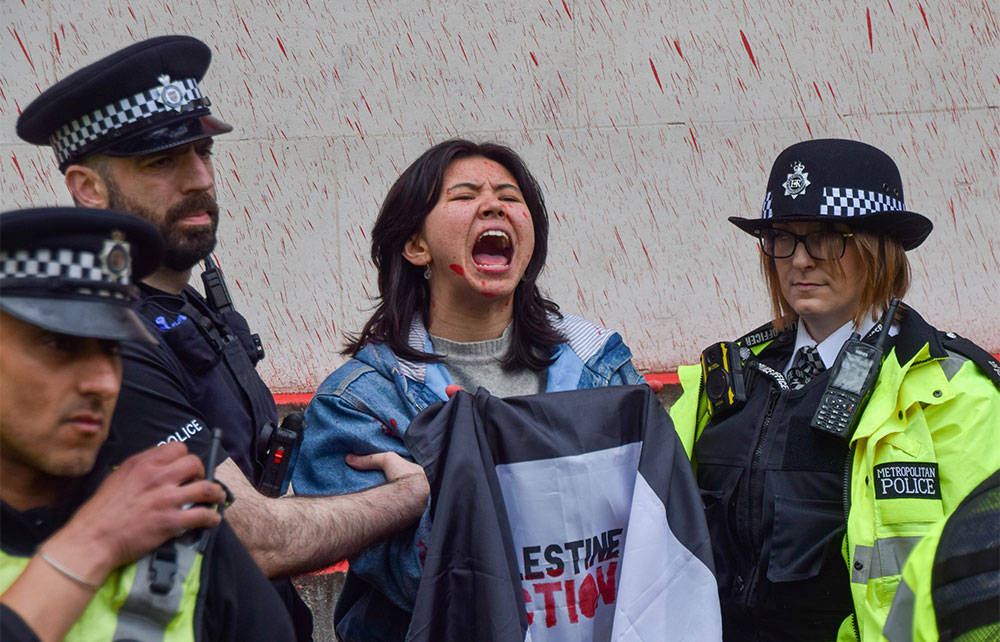‘Won’t you take me to… Funkytown!’ At around 10 p.m., in a bar under a railway arch in south London, members of a group called Youth Demand are doing the conga to 1970s disco music. They are celebrating a week of good protesting. ‘I’m sooo ketty!’ shouts a girl on the dance floor. (‘I’ve taken a drug called ketamine,’ is what she means.) Youth Demand want Britain to stop selling weapons to Israel. Earlier this month they put toddlers’ shoes outside Keir Starmer’s house, and a day later threw red paint on the Ministry of Defence. Their actions got lots of press coverage, so they’re having a party.
Many protestors are only helping out for the week. Few want a full-time struggle – they have lives to lead
Youth Demand copy the shock tactics used by groups such as Extinction Rebellion, Insulate Britain and Just Stop Oil, who in the past few years have blocked roads, chucked soup at the Mona Lisa and glued themselves to the Speaker’s chair in the House of Commons. Last year, the government passed laws to shut down the ‘disruptive’ demonstrations of these campaigns. The groups say that they’re inspired by the 20th-century civil rights and gay-rights movements. They’re simply operating in the noble tradition of dissent! It’s true: not much of Youth Demand is original. It’s a recent creation, but it attracts tired minds.
Outside the railway arch bar, away from the conga, a couple of young drunk communists are discussing the preconditions for revolution at a wooden picnic bench. They’re selling a newspaper called the Communist – ‘first grade theoretical material and razor-sharp Marxist analysis’, according to its website. The pair postulate: ‘Obviously we can’t have a revolution with the parliamentary system… The USSR grew despite the bureaucracy… Well, in 1917… You know they made abortion free?’ Next to the poundshop politburo, two revolutionaries kiss across the tabletop. There are probably 50 people at the party. They chant ‘Free Palestine!’ occasionally, and many wear keffiyehs. They’re nostalgic for a left-wing revolutionary heyday that ended decades ago and which they never experienced.
Middle-class kids drive Youth Demand, as the middle-class drive progressivism everywhere in the world. The quite-well-off revolted in the ‘Springtime of Peoples’ in Europe in 1848, brought Raul Alfonsin to power in Argentina in 1983 after the military junta, and led anti-corruption protests in Iraq in 2015. The poor never protest because they see no hope of change; the rich always want to keep things exactly as they are. It makes the middle-class powerful people. Tonight’s party-goers wear the muted, baggy, layered clothes that are call signs of their strata. Members of Youth Demand went to the French International School in Hong Kong. They’re doing PhDs at Cambridge. Lots are international students.
Many of the protestors here are only helping out for the week. Few want to do this full-time – people have lives to lead. Researchers following Danish jihadists who fought in Syria and Iraq after the Arab Spring found that many just logged their time away from work as annual leave. Struggling for the caliphate was a temporary escape from everyday boredom. When the foreign fighters came back and rejoined Danish society, they reported feeling a distinction between their ‘righteous and pious activity’ and the immorality of western life.
Protest today offers a similar passing fix for kids who want out of their anxious adolescence, and want to feel good about something. Youth Demand is neatly arranged to attract part-timers and wannabes. Recruits sign up online – the age cut-off is, unofficially, 30 – and are given free accommodation if they come to London and join in person. The campaigns are organised into week-long blocks. It ensures maximum pressure on politicians, but it also means participants don’t miss too many university commitments. People can come, then go.
Before the party, Youth Demand held a ‘Youth Assembly’ to discuss the next targets of their protests. They wrote ideas on big sheets of paper and left them lying at the back of a bar while they celebrated. ‘Rishi Sunak pool/pond – dyeing it red – pool party?’ someone wrote. ‘CEOs’ houses’; ‘water (Thames)’; ‘Planes/private jets’; ‘Eton’; ‘Transgressive stuff’. Youth Demand officials say their next campaign will be in June, with the six weeks until then used for ‘remobilising towards a new action phase’. They insist that what comes next will remain ‘non-violent’, the guiding principle of one of their forebears, Mahatma Gandhi.
Today’s young dissenters have the dressings of protesting legend but face none of the genuine danger. In Gandhi’s day, and in the civil-rights protests, demonstrators were beaten and gassed and charged by police on horseback. At today’s demonstrations, officers walk over to the participants, lift them up and put them in a police van. In many cases, the arrested smile and wave at the press from the back of the wagon, or they make a cute heart shape with their fingers. They spend the night in a cell, and they’re released the next day. It amounts to an unsaid agreement with the police: the kids aren’t really dangerous, so treat them nicely. Courts have ordered a few arrested Youth Demand protestors to wear electronic tags, so they can’t leave their county for a while, but that’s as bad as it gets. ‘Awfully harsh bail conditions,’ complained the group in a post on Instagram.
The aims of Youth Demand are perfectly out of reach. Britain won’t stop selling arms to Israel, so protestors can live the revolutionary lifestyle without any responsibility. ‘I think we just freed Palestine with that chanting!’ says a ginger twentysomething, keffiyeh wrapped around head, after a few rounds of shouting outside the bar. By midnight, everyone’s had quite a bit to drink, and people are leaving to smoke a joint in a nearby park. The conga is finished. It’s nearly time to go home: lectures in the morning.






Comments